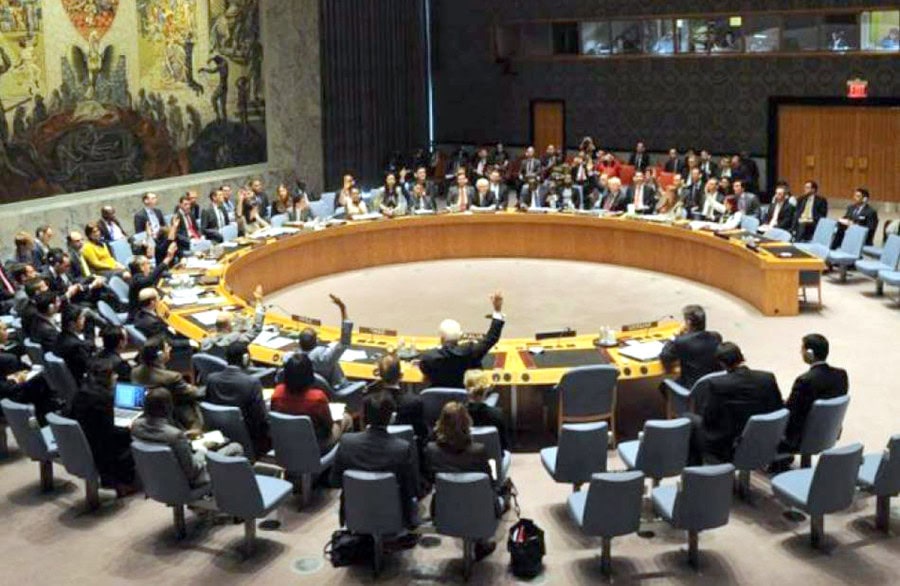On Thursday, the UN Security Council held a session to discuss the situation in Afghanistan. In the session, many of the participants called attention to the devastating earthquake, the human rights situation, restrictions on Afghan women and girls and the overall crisis ongoing since the collapse of republic government in August 2021.
Ramiz Alakbarov, UNAMA acting head, called for concerted international support for a swift humanitarian response to the devastating earthquake in Afghanistan.
“Humanitarian actors mobilized an immediate response, dispatching ambulances, medical equipment, trauma kits, medicine, mobile health teams and emergency supplies including tents, blankets, plastic sheeting and food assistance,” said Alakbarov.
Pointing to the current situation within Afghanistan, Alakbarov said that the de facto authorities have increasingly restricted the exercise of basic human rights, such as freedom of peaceful assembly, freedom of opinion and expression, quelling dissent and restricting civic space in the country.
“These restrictions continue to be aimed particularly at the rights and freedoms of Afghan women and girls, limiting their involvement in social, political and economic life. These include most prominently the ban on secondary schooling for girls and the decision to impose face covering on women, on which you have been briefed in detail by former Special Representative of the Secretary-General Deborah Lyons,” said Alakbarov.
He added that UNAMA hears credible allegations of killings, ill-treatment and other violations targeting individuals associated with the former government.
Despite all these challenges, he said that UNAMA will remain in Afghanistan to safeguard the rights of Afghans and the especially rights of women and girls, and that the strategy of engagement and dialogue could be the only way to benefit both the Afghan people and regional and international security.
Yalda Hakim, an international correspondent, said she was there (Security Council Meeting) as someone who has been reporting from Afghanistan for the past 15 years, as well as “a daughter of Afghanistan” with personal and deep connection with the nation.
Yalda talked about the restrictions for Afghan women under the Islamic Emirate rule and said that it has been 279 days since the Taliban banned teenage girls from school.
“Afghanistan is now the only country in the world where girls are prevented from getting an education, locked out of their classrooms, simply because of their gender. Education is not a privilege, but a basic human right,” Yalda said.
Martin Griffiths, Under-Secretary-General for Humanitarian Affairs and Emergency Relief Coordinator, via a teleconference pointed to the dramatic change that has happened in Afghanistan’s political and economic areas after the collapse.
Martin Griffiths further said that 25 million people in Afghanistan are now living in poverty — more than double from 2011. “Today, the average household spends three quarters of its income on food,” he said, stressing that 19 million people — nearly half the population — are food insecure, including 6.6 million at emergency levels, the highest number of any country in the world,” he said.
Afghanistan’s representative, Naseer A. Faiq, said earning legitimacy requires winning the minds and hearts of all Afghans, and Afghan people were hoping to see changes in the policies of the de facto authorities in the last 10 months.
“This has been far from realized,” he said, citing the Islamic Emiratesl’s inflexible attitude towards creating an accountable national government staffed by professional women and minorities. To prevent Afghanistan from becoming a pariah state, he called for a national dialogue among all Afghans, organized and facilitated by the United Nations, and including representatives of the Islamic Emirate and opposition groups. To the Islamic Emirate, he said earning legitimacy requires winning the minds and hearts of all Afghans.
Yalda Royan, an Afghan women’s rights advocate who was speaking at the session, said that human rights violations are occurring inside Afghanistan. “UNAMA has recently underreported human rights violations and said that rhetoric against the Islamic Emirate must be backed up by actions” and “stop patronizing Afghan women with awards and empty praise.”
The UK representative at the UNSC hearing said that the humanitarian and economic situation remains critical in Afghanistan. “Women and girls in Afghanistan are facing unacceptable restrictions on their freedom of movement and dress as well as access to education, jobs and services.”
The US representative at the UNSC hearing said that the Islamic Emirate must reverse its actions regarding women if they want a normalized relationship with the international community.
The US representative said the US remains the largest humanitarian supporter to Afghanistan.
According to the Iranian media, Iran’s permanent representative to the UN, Majid Takht Ravanchi, said that there is an absolute need to form an inclusive government in Afghanistan with the participation of all ethnic groups.
He underlined that Afghanistan’s assets were blocked in the United States and belong to the Afghan people, and releasing the funds must not be politicized.—Tolonews










